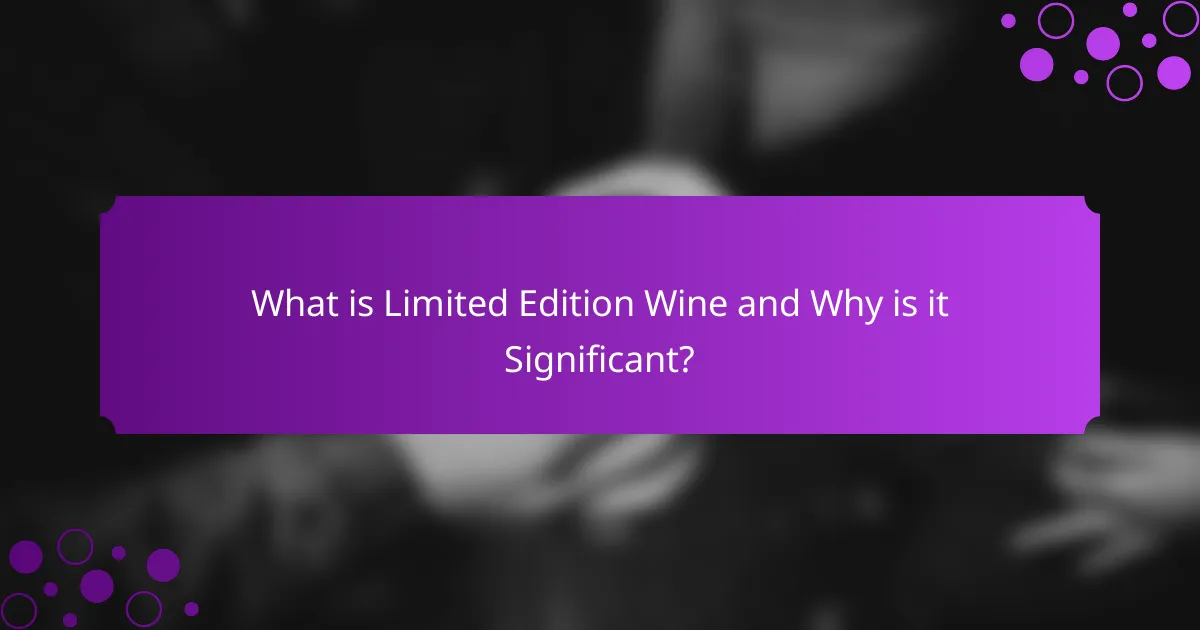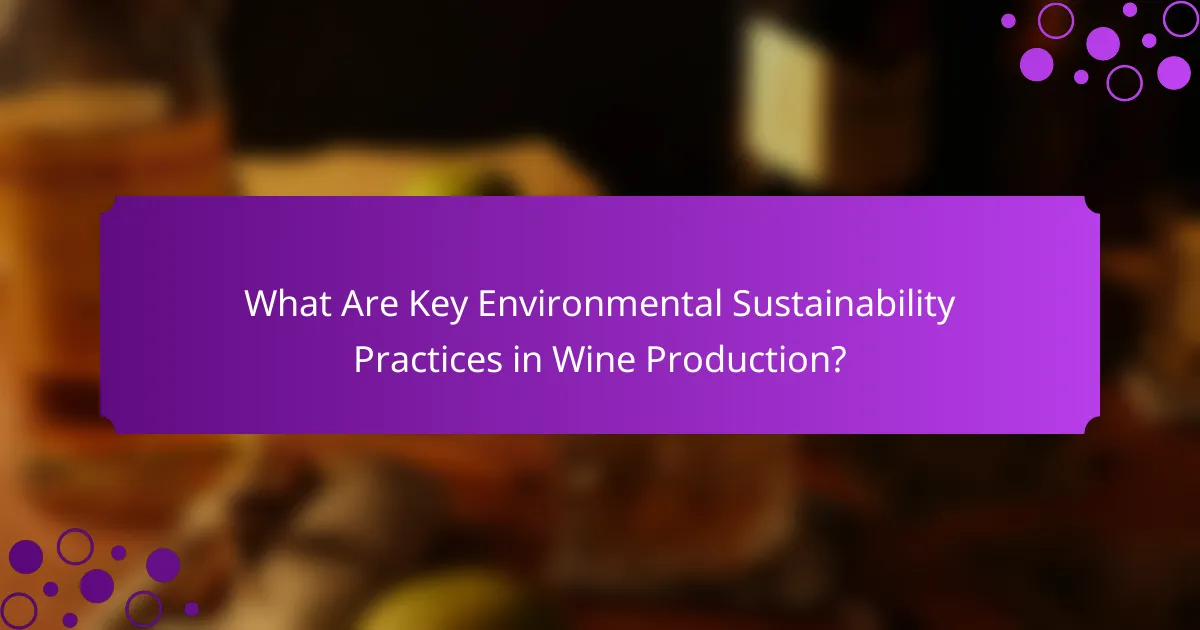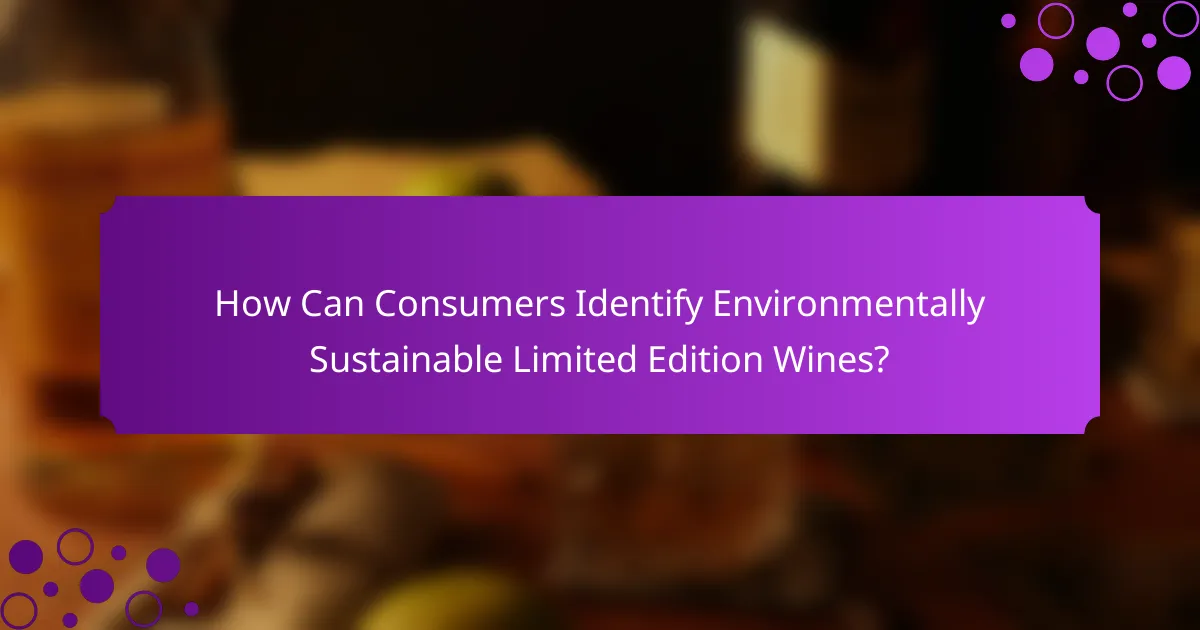
What is Limited Edition Wine and Why is it Significant?
Limited edition wine is a specific type of wine produced in limited quantities. This exclusivity often arises from unique vineyard conditions, special techniques, or exceptional grape varieties. Limited edition wines are significant because they often carry higher value due to their rarity and craftsmanship. They can reflect the winemaker’s artistry and innovation. Additionally, these wines may showcase sustainable practices in their production. This aligns with growing consumer interest in environmentally friendly options. Limited edition wines can also enhance a winery’s reputation and attract collectors. The unique attributes often lead to higher demand and prices in the market.
How is Limited Edition Wine Different from Regular Wine?
Limited edition wine differs from regular wine primarily in its exclusivity and production scale. Limited edition wines are produced in smaller quantities, often reflecting unique characteristics or specific vintages. These wines may feature distinctive flavor profiles, as they are made from select grapes or specific vineyard sites. Regular wines, on the other hand, are typically produced in larger volumes and may lack the same level of uniqueness.
Limited editions often have special labels or packaging that emphasize their rarity. Additionally, they may be crafted with more attention to detail in the winemaking process. This can include hand-harvesting grapes and using traditional methods. The limited availability often creates a higher demand, which can increase their market value.
In summary, the key differences lie in production scale, exclusivity, and the unique characteristics of the wine.
What criteria define a wine as ‘limited edition’?
A wine is defined as ‘limited edition’ based on specific production criteria. These criteria often include a restricted quantity produced, typically fewer than 1,000 cases. Limited editions may also involve unique varietals or blends not commonly available. The use of special vineyard sites or specific harvest years can further qualify a wine as limited edition. Additionally, packaging that distinguishes the wine, such as custom labels or bottles, is a common feature. The rarity and exclusivity often enhance the perceived value of these wines. Limited edition wines are frequently released to celebrate milestones or special events in a winery’s history.
How does scarcity impact the value of Limited Edition Wine?
Scarcity significantly increases the value of Limited Edition Wine. When a wine is produced in limited quantities, it creates a sense of exclusivity. This exclusivity drives demand among collectors and enthusiasts. Higher demand typically leads to higher prices. Additionally, limited availability can enhance the perceived quality of the wine. Historical data shows that wines with scarcity often appreciate in value over time. For example, certain limited releases from renowned wineries have seen price increases of over 200% in a decade. Thus, scarcity is a key factor in determining the market value of Limited Edition Wine.
What Role Does Environmental Sustainability Play in Wine Production?
Environmental sustainability plays a crucial role in wine production by minimizing ecological impact. Sustainable practices in vineyards include organic farming and water conservation. These methods reduce chemical usage and preserve biodiversity. For instance, organic vineyards use natural pest control, which enhances soil health. Water-efficient irrigation systems help conserve resources in regions facing drought. Studies show that sustainable practices can improve grape quality and yield. Additionally, eco-friendly packaging reduces carbon footprints. Overall, sustainability in wine production supports environmental health while maintaining quality.
Why is sustainability important in the wine industry?
Sustainability is important in the wine industry because it ensures long-term viability of vineyards and wine production. Sustainable practices reduce environmental impact, conserve resources, and promote biodiversity. For instance, organic farming methods minimize chemical use, improving soil health. Water conservation techniques help maintain water quality and availability. According to a study by the California Sustainable Winegrowing Alliance, sustainable practices can lead to increased profitability. Additionally, consumers increasingly prefer sustainably produced wines. This trend drives market demand and supports responsible production methods. Overall, sustainability enhances the quality of wine while protecting the environment for future generations.
How do sustainable practices affect the quality of Limited Edition Wine?
Sustainable practices enhance the quality of Limited Edition Wine by promoting healthier vineyards. These practices include organic farming, which reduces chemical inputs. Healthier vines lead to better grape quality. Better grape quality directly influences wine flavor and complexity. Sustainable practices also improve soil health, which supports vine growth. Improved soil health results in more balanced grapes. Furthermore, sustainable methods often focus on biodiversity, which can enhance ecosystem resilience. This resilience contributes to the overall quality of the wine produced.

What Are Key Environmental Sustainability Practices in Wine Production?
Key environmental sustainability practices in wine production include organic farming, water conservation, and energy efficiency. Organic farming reduces chemical inputs and promotes biodiversity. Many vineyards use cover crops to enhance soil health and prevent erosion. Water conservation techniques include drip irrigation and rainwater harvesting. Energy efficiency is achieved through solar panels and energy-efficient equipment. Additionally, some wineries implement waste recycling and composting programs. These practices contribute to a reduced carbon footprint and promote ecological balance. The adoption of these methods is increasingly recognized as vital for long-term sustainability in the wine industry.
How do vineyards implement eco-friendly farming techniques?
Vineyards implement eco-friendly farming techniques by using organic farming practices. They avoid synthetic pesticides and fertilizers. Instead, they utilize natural alternatives like compost and cover crops. Crop rotation is employed to maintain soil health. Integrated pest management is practiced to control pests sustainably. Water conservation techniques, such as drip irrigation, are implemented to reduce water usage. Many vineyards also promote biodiversity by preserving native plant species. These methods contribute to a healthier ecosystem and reduce the carbon footprint of wine production.
What are the benefits of organic and biodynamic farming?
Organic and biodynamic farming offers numerous benefits. These methods enhance soil health by using natural compost and crop rotations. They reduce chemical inputs, leading to less pollution in ecosystems. Biodynamic practices promote biodiversity, fostering a balanced ecosystem. Organic farming can improve crop resilience against pests and diseases. Studies show organic produce often contains higher antioxidant levels. These farming methods can lead to better tasting wines, enhancing consumer satisfaction. Additionally, they support sustainable practices that benefit future generations.
How does water conservation impact vineyard sustainability?
Water conservation significantly enhances vineyard sustainability. It reduces water usage, which is crucial in regions facing water scarcity. Efficient irrigation practices, like drip systems, minimize waste and ensure better water management. This not only preserves local water resources but also reduces operational costs for vineyard owners. Studies show that vineyards practicing water conservation can maintain grape quality while using up to 50% less water. Additionally, sustainable water practices contribute to healthier ecosystems by preventing soil erosion and protecting surrounding habitats. Overall, water conservation is essential for long-term vineyard viability and environmental health.
What innovative technologies are used in sustainable wine production?
Innovative technologies used in sustainable wine production include precision viticulture, which employs data analytics to optimize vineyard management. This technology utilizes sensors and satellite imagery to monitor soil health and grape ripeness. Another technology is drip irrigation, which conserves water by delivering it directly to the plant roots. Additionally, renewable energy sources, such as solar panels, are increasingly used in wineries to reduce carbon footprints. Furthermore, biotechnology is applied to develop disease-resistant grape varieties, minimizing the need for chemical pesticides. These technologies collectively enhance sustainability in wine production by improving resource efficiency and reducing environmental impact.
How do solar energy and renewable resources contribute to sustainability?
Solar energy and renewable resources significantly contribute to sustainability by reducing greenhouse gas emissions. They provide clean energy alternatives to fossil fuels. Solar panels harness sunlight, generating electricity without harmful emissions. According to the International Energy Agency, solar power could reduce carbon dioxide emissions by up to 4.2 gigatons annually by 2040. Renewable resources, such as wind and hydro, also offer sustainable energy solutions. These resources help conserve natural ecosystems by minimizing land degradation and pollution. Sustainable practices in energy production support biodiversity and promote healthier environments. Overall, solar energy and renewables are essential for achieving long-term sustainability goals.
What role does waste management play in eco-friendly wine production?
Waste management is crucial in eco-friendly wine production. It minimizes environmental impact by reducing waste generated during the winemaking process. Effective waste management practices include recycling, composting, and reusing materials. For instance, grape pomace can be composted to enrich soil. This practice not only reduces landfill waste but also enhances vineyard health. Studies show that sustainable waste management can lead to a 30% reduction in overall waste. Additionally, proper waste management improves a winery’s carbon footprint. By managing waste effectively, wineries contribute to a more sustainable ecosystem.

How Can Consumers Identify Environmentally Sustainable Limited Edition Wines?
Consumers can identify environmentally sustainable limited edition wines by looking for certifications and labels. Certifications like organic, biodynamic, or sustainable viticulture indicate eco-friendly practices. Labels should mention environmentally friendly farming methods, such as reduced pesticide use or water conservation efforts. Additionally, consumers can research the winery’s practices through their website or sustainability reports. Many wineries provide transparency about their sourcing and production methods. The presence of eco-friendly packaging, such as recycled materials or lightweight bottles, also signifies sustainability. Engaging with wine communities or forums can provide insights from other consumers about sustainable options.
What certifications should consumers look for in sustainable wines?
Consumers should look for certifications like Organic, Biodynamic, and Sustainable Winegrowing. Organic certification ensures that no synthetic pesticides or fertilizers are used. Biodynamic certification goes further by promoting holistic farming practices. Sustainable Winegrowing certifications often include guidelines for water conservation and soil health. Additionally, certifications from organizations like the California Sustainable Winegrowing Alliance provide verified sustainable practices. These certifications help consumers identify wines produced with environmentally friendly methods. The presence of these certifications indicates a commitment to sustainability in wine production.
How do labels and marketing reflect sustainability practices?
Labels and marketing reflect sustainability practices by communicating eco-friendly attributes of products. They often highlight certifications such as organic or biodynamic, indicating adherence to sustainable farming methods. For instance, labels may display symbols like the USDA Organic seal. Marketing campaigns frequently emphasize the use of recyclable materials and reduced carbon footprints. This approach aligns with consumer demand for transparency in sourcing and production. Research shows that 66% of consumers are willing to pay more for sustainable brands. Brands that effectively market their sustainability practices often see increased customer loyalty and trust.
What are the best practices for enjoying Limited Edition Wine sustainably?
To enjoy Limited Edition Wine sustainably, prioritize purchasing from wineries that use eco-friendly practices. Look for certifications such as organic or biodynamic. These wines often have a lower environmental impact. Additionally, consider buying directly from the winery. This reduces transportation emissions and supports local economies. Store wine properly to avoid spoilage and waste. Use sustainable materials for storage, like recycled corks or glass. When serving, pour only what you plan to consume to minimize waste. Pair wine with local, seasonal foods to enhance the experience while supporting sustainable agriculture. Lastly, recycle or repurpose wine bottles after use. This reduces landfill waste and promotes recycling efforts.
How can consumers support sustainable wine brands?
Consumers can support sustainable wine brands by choosing wines that are certified organic or biodynamic. These certifications indicate environmentally friendly practices in grape growing and wine production. Additionally, consumers can research and select brands that prioritize sustainable packaging. Brands that use recycled materials or lightweight bottles reduce their carbon footprint. Supporting local wineries can also contribute to sustainability by reducing transportation emissions. Engaging with brands on social media can raise awareness about their sustainable practices. Lastly, attending wine tastings or events focused on sustainability can help consumers learn more and make informed choices.
What tips can enhance the experience of tasting Limited Edition Wine while being eco-conscious?
To enhance the experience of tasting Limited Edition Wine while being eco-conscious, choose organic or biodynamic wines. These wines are produced with sustainable farming practices. Look for certifications like USDA Organic or Demeter Biodynamic. Use reusable glassware instead of disposable options. This reduces waste and enhances the tasting experience. Pair the wine with locally sourced foods. Supporting local producers minimizes carbon footprint. Participate in eco-friendly tasting events or wine clubs. These often focus on sustainable practices. Educate yourself about the winery’s environmental initiatives. Understanding their efforts can deepen appreciation for the wine. Lastly, recycle or compost wine packaging. This contributes to a circular economy.
Limited edition wine is a unique category of wine produced in small quantities, often characterized by exceptional vineyard conditions and sustainable practices. This article explores the significance of limited edition wines, highlighting their exclusivity, the criteria that define them, and how scarcity impacts their market value. Additionally, it examines the role of environmental sustainability in wine production, including practices such as organic farming and water conservation, and how these methods enhance wine quality. Consumers are guided on identifying sustainable limited edition wines through certifications and eco-friendly practices, ultimately supporting a more sustainable wine industry.